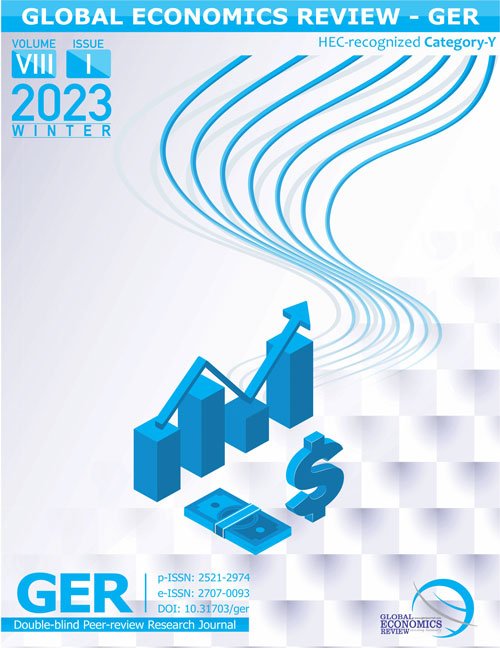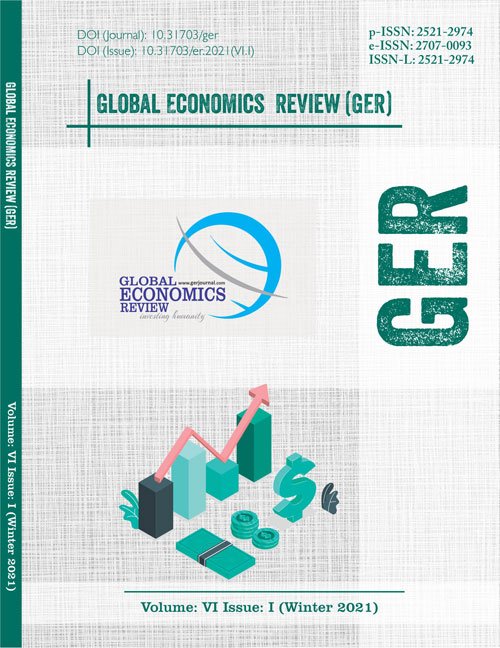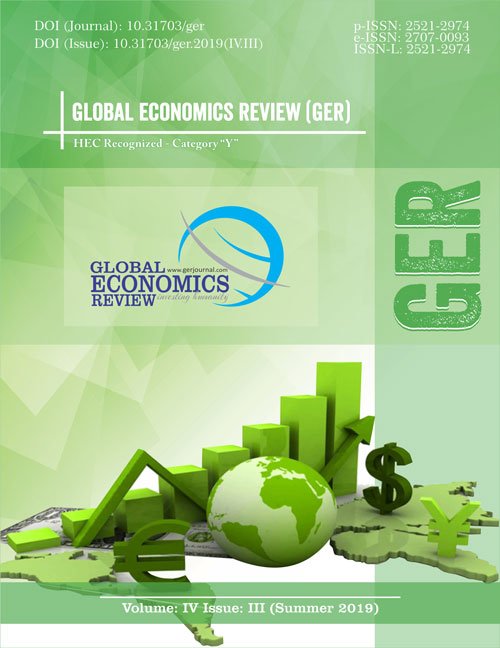01 - Role of Capital structure in financial performance of non-financial sector firms
http://dx.doi.org/10.31703/ger.2020(V-II).0110.31703/ger.2020(V-II).01 Published : Jun 2020
-
This paper looks at financial performance of non-financial sectors of Pakistan concerning capital structure. We gathered data from annual audited financial statements of 152 firms listed at PSX during 2010-2017. To analyze data gathered, we have employed descriptive, correlation and regression analyses techniques. The findings show substantial positive contribution of LTDA in EPS and ROA and signi... Details
-
Capital Structure, Financial Performance, Non-Financial Sector
-
(1) Hafiz Abdur Rashid
PhD Scholar, Superior College, Lahore, Punjab, Pakistan.
(2) Ahmed Raza Bilal
Associate Professor, Department of Business & Management Sciences, Superior College, Lahore, Punjab, Pakistan.
02 - Precursors of Pollen Allergies: An Anthropo-Economic Perspective
http://dx.doi.org/10.31703/ger.2020(V-II).0210.31703/ger.2020(V-II).02 Published : Jun 2020
-
This explanatory study is intended to determine precursors of pollen allergies, an anthropo-economic perspective. In a nutshell, it deals with how pollen allergy is produced, circulated and dealt with in the setting of twin cities; Islamabad and Rawalpindi. Medically, allergies can be prevented but not cured. The cultural means of prevention and care are always preferred by the needs of the body, ... Details
-
Cultural Economy, Nose Redness, Itchy Eyes, Paper Mulberry, Pollen Allergies Twin Cities
-
(1) Ghazala Idrees
MPhil Scholar, Department of Anthropology, PMAS-Arid Agriculture University, Rawalpindi, Punjab, Pakistan.
(2) Abid Ghafoor Chaudhry
Chairman/Associate Professor, Department of Anthropology, PMAS-Arid Agriculture University, Rawalpindi, Punjab, Pakistan.
03 - Financing Inclusive Growth through FDI: Incorporating the Role of Institutional
http://dx.doi.org/10.31703/ger.2020(V-II).0310.31703/ger.2020(V-II).03 Published : Jun 2020
-
Countries need a tremendous amount of investment to utilize existing resources and enhance productivity in order to ensure inclusive growth in the economy. Foreign Direct Investment (FDI) by providing the required investment can fulfil the saving-investment gap. The paper makes an empirical investigation of the effectiveness of FDI as a financing tool for inclusive growth. The study also examines ... Details
-
Inclusive Growth, Institutional Quality, Foreign Direct Investment, Equity
-
(1) Muneza Munir
PhD scholar, Applied Economics Research Centre, University of Karachi, Karachi, Sindh, Pakistan.
(2) Ambreen Fatima
Associate Professor, Applied Economics Research Centre, University of Karachi, Karachi, Sindh, Pakistan.
04 - Socio-economic Causes of Malnutrition among Pre-School Children in Pakistan: A G
http://dx.doi.org/10.31703/ger.2020(V-II).0410.31703/ger.2020(V-II).04 Published : Jun 2020
-
The most common perception is that the prevalence of malnutrition among females is higher than males. To solve this dilemma, the present article analyzes the impact of socioeconomic factors on the nutritional status of under-five children by gender using a binary logistic regression model. Utilizing the Pakistan Demographic and Health Survey [PDHS]-2013 data, a CIAF index is constructed to measure... Details
-
Binary Logistic Model, Child Health, Disaggregated Analysis, Malnutrition, CIAF, PDHS
-
(1) Muhammad Shahid
Department of Health Economics, Pakistan Institute of Development Economics Islamabad, Pakistan.
(2) Madeeha Gouhar Qureshi
Department of Economics, Pakistan Institute of Development Economics Islamabad, Pakistan.
(3) Jam Farooq Ahmed
Department of Anthropology, Quaid-I-Azam University Islamabad, Pakistan.
05 - Impact of Macroeconomics Factors and Political Regimes on Fluctuation in Number
http://dx.doi.org/10.31703/ger.2020(V-II).0510.31703/ger.2020(V-II).05 Published : Jun 2020
-
The aim of the study is to determine the factors that fluctuate the numbers of IPOs (NIPOs) issued in Pakistan from 1992 to 2017. Firstly, the study examined the impact of macroeconomic factors such as GDP, Consumer Price Index (CPI), market return, Industrial production index, market volatility, and political stability on the NIPOs. Secondly, the study determined the impact of political regimes (... Details
-
IPOs Cycle, Capital Demand Hypothesis, Political Regimes, Pakistan
-
(1) Fazli Raheem
MS Scholar, Institute of Business Studies and Leadership, Abdul Wali Khan University Mardan, KP, Pakistan.
(2) Shehzad Khan
Assistant Professor, Institute of Business Studies and Leadership, Abdul Wali Khan University Mardan, KP, Pakistan.
(3) Muhammad Faizan Malik
Assistant Professor, Institute of Business Studies and Leadership, Abdul Wali Khan University Mardan, KP, Pakistan.
06 - China's Built and Road Initiative: Challenges and Opportunities in Xinjiang
http://dx.doi.org/10.31703/ger.2020(V-II).0610.31703/ger.2020(V-II).06 Published : Jun 2020
-
China's peaceful ascent has had a significant impact on the global economic system. There are two major reasons for this: the first and most important is Beijing's peaceful expansionist policies, and the second is its advanced industries and technologies. Their goal is to dominate global raw materials as well as the market through their goods. China has been working hard to promote built-and-road ... Details
-
Sophisticated, Expansionism, Socio-Economic Development, Xinjiang, Burgeoning
-
(1) Shabnam Gul
Assistant Professor, Department of Political Science, Lahore College for Women University, Lahore, Punjab, Pakistan.
(2) Ali Khan
Phd Scholar, Department of Political Science, Quartaba University, KP, Pakistan.
(3) Aftab Alam
Phd Scholar, Centre for South Asian Studies, University of the Punjab, Lahore, Punjab, Pakistan.
07 - Empirical Analysis of the Factors affecting Current Account Deficit in Pakistan
http://dx.doi.org/10.31703/ger.2020(V-II).0710.31703/ger.2020(V-II).07 Published : Jun 2020
-
The maintenance of a balanced current account is among the enormous challenges faced by most of the developing economies. This study seeks to examine the determinative factors of the current account deficit in Pakistan over the period of 1976-2020.Assessment of these factors has been made within the stipulated structure of the ARDL model.Findings reveal that fiscal sustainability, sustainable econ... Details
-
Current Account Deficit, Fiscal Deficit, Economic Growth, Pakistan
-
(1) Minhajuddin
Assistant Professor, Department of Economics, Faculty of Business and Economics, Abdul Wali Khan University Mardan, KP, Pakistan.
(2) Malik Bakhsheesh
MPhil Scholar, Department of Economics, Qurtuba University of Science and Information Technology, Peshawar Campus, KP, Pakistan.
(3) Muhammad Sohail Alam Khan
Lecturer, Department of Economics, Faculty of Business and Economics, Abdul Wali Khan University Mardan, KP, Pakistan.

 Volume X, Issue II (Spring 2025)
Volume X, Issue II (Spring 2025)  Volume IX, Issue III (Summer 2024)
Volume IX, Issue III (Summer 2024)  Volume IX, Issue II (Spring 2024)
Volume IX, Issue II (Spring 2024)  Volume IX, Issue I (Winter 2024)
Volume IX, Issue I (Winter 2024)  Volume VIII, Issue IV (Fall 2023)
Volume VIII, Issue IV (Fall 2023)  Volume VIII, Issue III (Summer 2023)
Volume VIII, Issue III (Summer 2023)  Volume VIII, Issue II (Spring 2023)
Volume VIII, Issue II (Spring 2023)  Volume VIII, Issue I (Winter 2023)
Volume VIII, Issue I (Winter 2023)  Volume VII, Issue IV (Fall 2022)
Volume VII, Issue IV (Fall 2022)  Volume VII, Issue III (Summer 2022)
Volume VII, Issue III (Summer 2022)  Volume VII, Issue II (Spring 2022)
Volume VII, Issue II (Spring 2022)  Volume VII, Issue I (Winter 2022)
Volume VII, Issue I (Winter 2022)  Volume VI, Issue IV (Fall 2021)
Volume VI, Issue IV (Fall 2021)  Volume VI, Issue III (Summer 2021)
Volume VI, Issue III (Summer 2021)  Volume VI, Issue II (Spring 2021)
Volume VI, Issue II (Spring 2021)  Volume VI, Issue I (Winter 2021)
Volume VI, Issue I (Winter 2021)  Volume V, Issue IV (Fall 2020)
Volume V, Issue IV (Fall 2020)  Volume V, Issue III (Summer 2020)
Volume V, Issue III (Summer 2020)  Volume V, Issue II (Spring 2020)
Volume V, Issue II (Spring 2020)  Volume V, Issue I (Winter 2020)
Volume V, Issue I (Winter 2020)  Volume IV, Issue IV (Fall 2019)
Volume IV, Issue IV (Fall 2019)  Volume IV, Issue III (Summer 2019)
Volume IV, Issue III (Summer 2019)  Volume IV, Issue II (Spring 2019)
Volume IV, Issue II (Spring 2019)  Volume IV, Issue I (Winter 2019)
Volume IV, Issue I (Winter 2019)  Volume III, Issue II (Fall 2018)
Volume III, Issue II (Fall 2018)  Volume III, Issue I (Spring 2018)
Volume III, Issue I (Spring 2018)  Volume II, Issue I (Fall 2017)
Volume II, Issue I (Fall 2017)  Volume I, Issue I (Fall 2016)
Volume I, Issue I (Fall 2016)